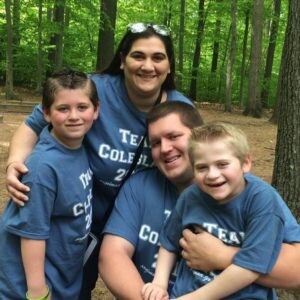
Friday Mar 02, 2018
#77 Rare Disease Day 2018
February 28th, 2018 was Rare Disease Day! Rare Disease Day is an opportunity to raise awareness for 7,000+ rare diseases and the 30 million Americans who are affected by a rare disease(s). There were events held worldwide to raise awareness. The theme for this year's Rare Disease Day is "Research" and the important role that patients play in gaining an understanding of rare diseases and developing innovative treatments or cures. This year's slogan is "Patients are not only subjects but also proactive actors in research."
This episode features a couple interviews with presenters, who I caught up with at the end of the Rare Disease Day event in Hartford, CT in the Legislative Office Building. This specific event is one I have attended for a few years and provides an opportunity for patients, caregivers, medical professionals and industry representatives to come together and educate elected officials about rare diseases, and what it’s like to live with or care for someone with a rare disease in the state.
A main focus of the event was newborn screening, including the addition of Pompe Disease and Mucopolysaccharidosis Type 1 (MPS1) for Connecticut. Connecticut covers over 60 diseases, while most other states only cover ~40 diseases.
A young man named Hunter Pageau spoke about his extremely rare disease, SMARD, Spinal Muscular Atrophy with Respiratory Distress. SMARD is an aggressive respiratory/neuromuscular disease causing paralysis and inability for patients to breathe on their own. And 1 of only 12 people in the United States, and of 80 worldwide, with SMARD. Being the trailblazer he is, he started YES, the young empowerment society for kids. He is a true inspiration and leader!
Going with the theme of this year’s Rare Disease Day, researchers shared how vital funding is to their research and the cascade effect initial funding can have. Stormy Chamberlain, PhD, a researcher at UCONN who focuses on Angelman Syndrome, explained how the Connecticut Stem Cell Research Fund led to NIH funding and partnerships with pharmaceutical companies such as Alexion. Presenting alongside her was Jim Kubicza, a father of a child who has Angelman Syndrome. As a fierce patient advocate, he joined the Angelman Syndrome Foundation to help raise some of this research money. He also shared some aspects of being the father of a child with a rare disease, including the burden of expensive seizure medication, full-time supervision of his son, and fighting for basic needs for his son at school. He shared more in our interview in this episode.
There was also a family with a daughter who has Dravet Syndrome. Beth Fox shared about her daughter's 250 unconscious seizures, despite trying multiple different medications, and their battles with her insurance company for coverage. In a cute moment, her daughter joined her at the podium, excited to introduce herself.
Jean Kelley also spoke as a patient advocate. Her son Brian has a rare neurological disease called Adrenoleukodystrophy (ALD) for which she started an organization, Brian’s Hope. She shares more during her interview in this episode.
Senators and Representatives also spoke about their support for rare diseases including the Connecticut Rare Disease Task Force. This bipartisan group focuses on newborn screening, insurance issues, support services in school systems among other topics. It takes 2.5 billion dollars and 12 years to develop a drug, so we need to give tax credits to companies so they have incentive to come to Connecticut for their research, which then helps the state. It’s fantastic that an event like this can bring legislators into the conversation so we can take action to help families with rare diseases.
For more information about Rare Disease please visit NORD’s rarediseases.org and check out the other episodes about rare diseases including previous Rare Disease Days.
No comments yet. Be the first to say something!